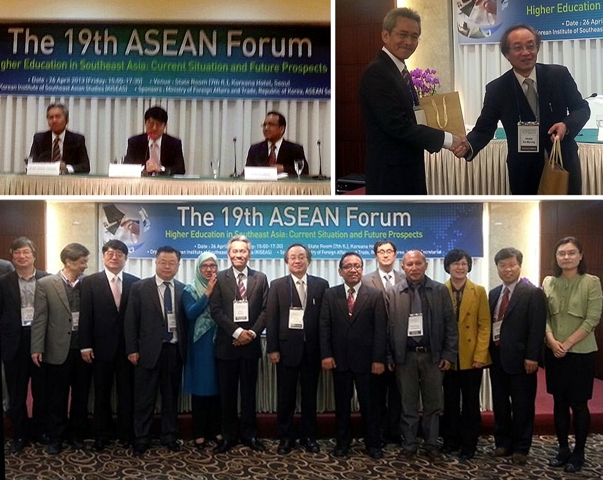INTERNATIONALISATION: BE MORE SENSITIVE TO CHANGES

SEOUL, KOREA, 26 April – The future education in the ASEAN countries will be heavily influenced by the internationalisation factor which requires students and lecturers to be more sensitive to changes in other countries.
According to the Universiti Sains Malaysia (USM) Vice-Chancellor, Professor Dato' Dr. Omar Osman, internationalisation efforts can be realised through systematic internationalisation programmes in terms of students exchange, short-term and long-term engagement of lecturers in various fields, from academic relations, research, culture, sports, knowledge transfer to networking.
"The outcome is that the university community is exposed to the things that have been carried out in other countries, while the students and lecturers from other countries can also come to the universites in Malaysia for the same purpose," said Omar.
Omar delivered his keynote address titled "Current Landscape of Higher Education in the ASEAN Region: Case of Malaysia and USM" in the 19th ASEAN Forum, organised by the Korean Institute of Southeast Asian Studies (KISEAS) in collaboration with the Ministry of Foreign Affairs, Republic of South Korea and the ASEAN Secretariat which consists of representatives from various agencies and universities here.
The theme of the 19th ASEAN Forum was "Higher Education in Southeast Asia: Current Situation."
Omar also stressed the need for the ASEAN academic community to unite together to achieve the aspiration of creating a strong ASEAN community as expressed through numerous plans that were included in the official ASEAN documents since its inception 45 years ago.
He added that this matter is particularly important since the efforts of realising the ASEAN community and the direction of higher education had been frequently expressed in various conferences.
Also participating in this forum were the Rector of Gadjah Mada University, Professor Pratikno, who presented a paper while three professors from the Conbuk National University, the Asian Institute for Policy Studies and Hankuk University of Foreign Studies were also involved in the discussion of both the papers.
"USM has also taken various steps in its internationalisation policy either as a Research University or APEX, established the "Global Citizens" programme through the introduction of fellowship scheme, strengthen relationships with various parties and countries through "the Blue Ocean Strategy" besides strengthening their ability to compete by improving the quality and excellence in teaching and learning as well as implementing various repositioning efforts to enhance the university’s position globally in order to be more visible in the ASEAN community and the world," said Omar.
According to him, the important thing is that USM and Malaysia have to be serious in realising the internationalisation effort without neglecting the national aspiration and the agenda, and at the same time strengthen the position and the ability of students to master the international culture, not only within ASEAN but also the world.
"On top of that, it is the desire of the Ministry of Higher Education Malaysia to make this country as a hub for international education with the target of having more than 100,000 foreign students studying in Malaysia.
During the question and answer session, the USM Vice-Chancellor was also being asked about the USM Healthy Campus programme, which was known by some academics in Korea.
Also present were the KISEAS Chairman, Professor Park Sa-Myung and the KISEAS Director General Professor Hong Seok-Joon. – Text: Mohamad Abdullah/Translation: Tan Ewe Hoe
- Created on .
- Hits: 1036
